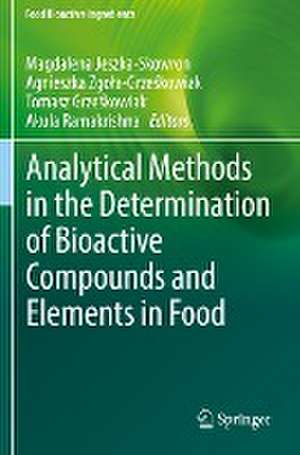Analytical Methods in the Determination of Bioactive Compounds and Elements in Food: Food Bioactive Ingredients
Editat de Magdalena Jeszka-Skowron, Agnieszka Zgoła-Grześkowiak, Tomasz Grześkowiak, Akula Ramakrishnaen Limba Engleză Paperback – 4 feb 2022
Analytical Methods in the Determination of BioactiveCompounds and Elements in Food explores both the influence of particular compounds on human health and the methods used for their determination. Chapters describe various aspects of food and plant analysis, including chromatographic and non‐chromatographic approaches as well as hyphenated techniques. Readers of this book will gain a comprehensive understanding of the important groups of bioactive compounds relevant to human health.
| Toate formatele și edițiile | Preț | Express |
|---|---|---|
| Paperback (1) | 1221.20 lei 6-8 săpt. | |
| Springer International Publishing – 4 feb 2022 | 1221.20 lei 6-8 săpt. | |
| Hardback (1) | 1227.36 lei 6-8 săpt. | |
| Springer International Publishing – 3 feb 2021 | 1227.36 lei 6-8 săpt. |
Preț: 1221.20 lei
Preț vechi: 1489.27 lei
-18% Nou
Puncte Express: 1832
Preț estimativ în valută:
233.68€ • 254.85$ • 197.04£
233.68€ • 254.85$ • 197.04£
Carte tipărită la comandă
Livrare economică 24 aprilie-08 mai
Preluare comenzi: 021 569.72.76
Specificații
ISBN-13: 9783030618810
ISBN-10: 3030618811
Ilustrații: VIII, 380 p. 52 illus., 38 illus. in color.
Dimensiuni: 155 x 235 mm
Greutate: 0.54 kg
Ediția:1st ed. 2021
Editura: Springer International Publishing
Colecția Springer
Seria Food Bioactive Ingredients
Locul publicării:Cham, Switzerland
ISBN-10: 3030618811
Ilustrații: VIII, 380 p. 52 illus., 38 illus. in color.
Dimensiuni: 155 x 235 mm
Greutate: 0.54 kg
Ediția:1st ed. 2021
Editura: Springer International Publishing
Colecția Springer
Seria Food Bioactive Ingredients
Locul publicării:Cham, Switzerland
Cuprins
1. Introduction – bioactive compounds and elements in human nutrition.- 2. Application of liquid chromatography for the analysis of flavonoids in food – an overview.- 3. Phenolic compounds in coffee and tea beverages.- 4. Methylxanthines in food products.- 5. Carotenoids as food products components and health promoting agents.- 6. Tocochromanols.- 7. Cyclitols - determination in food and bioactivity in the human organism.- 8. Capsaicinoids – properties and mechanisms of pro-health action.- 9. Dietary indoleamines: bioavailability and human health.- 10. Bioactive peptides analysis.- 11. Determination of antioxidant biomarkers in biological fluids.- 12. Speciation analysis of food products.- 13. Two sides of selenium. Occurrence and determination of selenium forms in food and environmental samples using analytical methods
Notă biografică
Magdalena Jeszka-Skowron, PhD is an assistant professor in the Institute of Chemistry and Technical Electrochemistry at the Poznan University of Technology in Poznań, Poland.
Agnieszka Zgoła-Grześkowiak, PhD, DSc is a professor in the Institute of Chemistry and Technical Electrochemistry at the Poznan University of Technology in Poznań, Poland.
Tomasz Grześkowiak, PhD is a volunteer scientist in the Institute of Chemistry and Technical Electrochemistry at the Poznan University of Technology in Poznań, Poland.
Akula Ramakrishna, PhD is a pipeline enablement scientist at Bayer Crop Science in Kallinayakanahalli, Chikkaballapur, India.
Agnieszka Zgoła-Grześkowiak, PhD, DSc is a professor in the Institute of Chemistry and Technical Electrochemistry at the Poznan University of Technology in Poznań, Poland.
Tomasz Grześkowiak, PhD is a volunteer scientist in the Institute of Chemistry and Technical Electrochemistry at the Poznan University of Technology in Poznań, Poland.
Akula Ramakrishna, PhD is a pipeline enablement scientist at Bayer Crop Science in Kallinayakanahalli, Chikkaballapur, India.
Textul de pe ultima copertă
Most bioactive compounds have antioxidant activity, particularly tocochromanols, phenolics (flavonoids and phenolic acids), methylxantines and capsaicinoids. Some of these compounds have also other properties important for human health. For example, vitamin E protects against oxidative stress, but it is also known for its “non-antioxidant” functions, including cell signalling and antiproliferation. Selenium compounds and indoleamins are the components of the antioxidant enzymes. Selenium makes vitamin E acquisition easier and controls its physiological functions. In taking part in enzymatic reactions and protecting the cell against free radicals, selenium shows immunomodulative, antiphlogistic, and antiviral activity. Capsaicinoids possess not only antioxidant, but also antibacterial, analgesic, weight-reducing and thermoregulation properties. Studies have also demonstrated their gastroprotective and anticancer properties.
Analytical Methods in the Determination of Bioactive Compounds and Elements in Food explores both the influence of particular compounds on human health and the methods used for their determination. Chapters describe various aspects of food and plant analysis, including chromatographic and non‐chromatographic approaches as well as hyphenated techniques. Readers of this book will gain a comprehensive understanding of the important groups of bioactive compounds relevant to human health.
Analytical Methods in the Determination of Bioactive Compounds and Elements in Food explores both the influence of particular compounds on human health and the methods used for their determination. Chapters describe various aspects of food and plant analysis, including chromatographic and non‐chromatographic approaches as well as hyphenated techniques. Readers of this book will gain a comprehensive understanding of the important groups of bioactive compounds relevant to human health.
Caracteristici
Explores both the influence of bioactive compounds on human health and the methods used for their determination Provides an overview of bioactive compounds with antioxidant activity, particularly tocochromanols, phenolics (flavonoids and phenolic acids), methylxantines and capsaicinoids Describes aspects of food and plant analysis, including chromatographic and non-chromatographic approaches as well as hyphenated techniques









